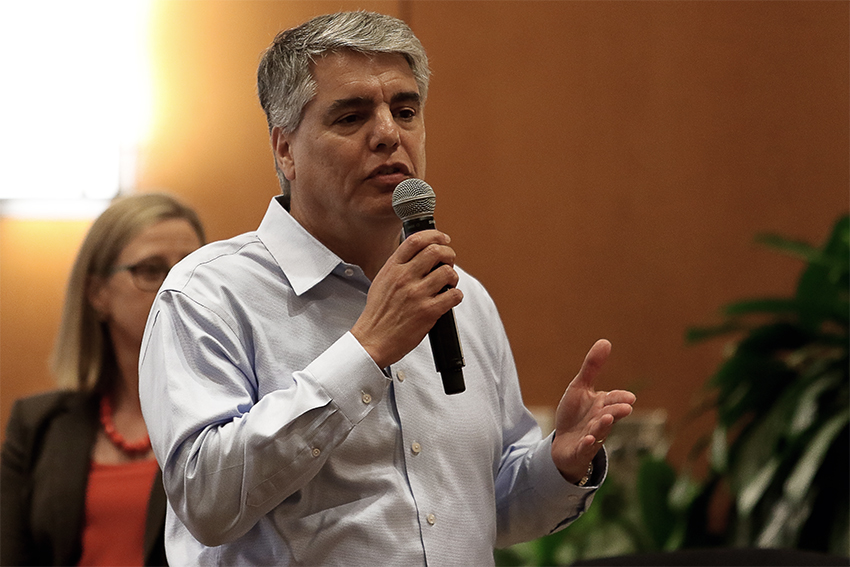Since the beginning of my undergraduate career, I have witnessed an exponential rise in anti-Muslim rhetoric. In my second semester of college, three Muslim students from the University of North Carolina (UNC) Chapel Hill were murdered execution-style in their own apartment. Two of them were Muslim, hijab-wearing college students in their early twenties — striving to leave the world just a bit better than they found it. I saw myself in them. As Donald Trump’s campaign was driven by anti-Muslim sentiment, I have slowly but surely grown numb to the encompassing hostility toward Muslims like myself.
In an environment where I have to tolerate fliers adorning the campus that state “imagine a world without Muslims,” where my fellow Muslims and myself are attacked for their headscarves, where we are being constantly surveilled by more task forces and committees than I can keep track of, where I am always seen as an “oppressed Muslim woman” before I’m seen as a human being, where people assume I don’t speak English when I speak three more languages than them, I am simply exhausted.
The truth of the matter is, we haven’t come a long way at all. The fact that a Muslim, hijab-wearing U.S. Olympian got a not-so-random search at the airport, reveals the discrimination that Muslim Americans have been forced to face on a daily basis. Other than Olympic fencer Ibtihaj Muhammad, Star Wars actor Riz Ahmed has been detained at airports and questioned about his religion — even when he attended his own premiere. In many ways, we have regressed decades despite the fact that Trump began his campaign a mere 21 months ago.
Instead of attempting to maintain American security, Trump’s “Muslim Bans” globally humiliate a country that was founded by immigrants on the principles of religious freedom and inclusion. It took the University close to a year to release a reformed Hate and Bias Incident Policy that originated in the 80’s. Since this policy took so many pushes from SG to get released, how are marginalized students supposed to rely on the administration to protect their rights? When will the University be proactive instead of reactive when it comes to students’ rights?
As college students, we have spent most of our lives in the shadow of 9/11. For the majority of our lives, discrimination has been an unfortunate reality. Muslim students shouldn’t have to step out of their homes with the fear of being verbally harassed for wearing a hijab. When students report harassment on campus, expecting a University-wide announcement and condemnation is not asking for much. When students report racist faculty members, it is the University’s responsibility to ensure that no student on campus feels threatened, instead of forcing the student to prove their humanity every day of class.
As a writer for The Daily Texan for over two years, I have been discussing my perspectives as an American Pakistani, a Muslim and as a columnist. I was first drawn to The Texan’s basement thinking that I could contribute my unique experiences and perspectives and bring light to the inherent discrimination on our campus. In the comment sections of my articles I’ve been called a terrorist. You can’t possibly imagine what that feels like in the state you’ve lived in for 17 years and the country you were born in. By serving as the only Muslim editor at The Texan, I am doing my part to represent. And by responding to concerns that Muslims on this campus voice with unfulfilled promises and silence, you are only furthering the divide.
After the town hall meeting, I realized exactly what I wanted from my student leaders — people who will be there for us in our most difficult moments. This isn’t about campaigning or politics — it’s about empathy, solidarity and understanding. When a Muslim student complains about fliers being spread around campus implicitly calling for their genocide, there should be immediate action and consequences for the perpetrators of anti-Muslim rhetoric. When a Muslim student is harassed on campus, authorities must publicly combat this hate and ensure that no student feels marginalized. If a Muslim registry is generated, I want everyone in Student Government to register in solidarity. No questions asked. We must stop undermining the concerns of minority students on campus by asking them to explain their oppression and ultimately be unanswered.
SG is expected to speak up against any sort of offensive and hateful rhetoric. When interviewing the three teams for SG candidacy, most of them mentioned that they were previously oblivious to the concerns of students feeling unwelcome on campus. If you are in a position of authority and are willing to represent our student body of 51,000 students, I am disappointed that you need visibly upset students — whose concerns have previously brought no action — at a town hall to tell you that we have a discrimination problem on campus. You don’t need to see two mosques in Texas burn to ashes for you to acknowledge that xenophobia is a problem. Students have the right to expect an environment that proactively condemns hateful rhetoric, especially that which insinuates the removal of a marginalized group from society. Minority students on campus like myself carry our political opinions with us as baggage everywhere we go. I don’t think it’s enough to be visible anymore — we have to be vocal about what we believe in.
Saifullah is a neuroscience senior from Richardson. She is an associate editor. Follow her on Twitter @coolstorysunao.





















